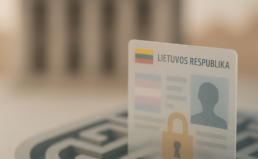In April and May, 2017 two Lithuanian transgender men successfully defended their right to legal gender recognition. On 7th April, 2017 the Vilnius City District Court obliged the Vilnius Civil Registry to change personal identification documents by applicant M.V. with the view of obtaining legal gender recognition without undergoing the compulsory gender reassignment surgery. On 2nd May, 2017 the same Court ruled that the Vilnius Civil Registry should change the gender marker and personal identification number for the applicant T. K.
After these groundbreaking developments the National LGBT* rights organization LGL has already received 15 new requests by transgender Lithuanians seeking legal gender recognition. According to Tomas Vytautas Raskevičius, LGL‘s Policy Coordinator (Human Rights), it is very likely that Lithuania will choose to implement the so-called “Portuguese model” and transgender people will be able to change their personal identification documents based exclusively on a diagnosis by a psychiatrist.
LGL‘s representative believes that recent Court decisions are undoubtedly a positive step towards progressive legal gender recognition, because these decisions are partially based on international human rights standards. “Essentially, the courts have started to bridge the legal gap that legislators are slow to regulate. It can be concluded that courts are taking on the legislator’s duty, reacting to human rights violations and, in doing this, recognizing the rights of transgender people,” commented Tomas Vytautas Raskevičius.
According to him, the recent court decisions are also important, because they create a legal precedent which will be reflected in any future legislation regarding legal gender recognition. “I believe that Lithuanian courts have created an important legal precedent which will have a powerful impact in this area in the future”, he explained.
Regarding the recent cases, the National LGBT* Rights organization LGL helped to prepare the court documents and financed litigation costs, because the association works as an advocacy organization and considers strategic litigation to be one of its priorities.
“We understand strategic litigation as cases that have importance not only to one individual, but also to the broader part of society,” commented T. V. Raskevičius. He believes that recent court decisions will encourage the members of the local trans* community to apply for legal gender recognition.
LGL‘s Policy Coordinator (Human Rights) stressed that the National LGBT* rights organization LGL has already received 15 new requests by transgender Lithuanians seeking for legal gender recognition. Due to the current situation in Lithuania, transgender people who do not have personal documents reflecting their gender identity constantly often find themselves in absurd situations. Usually it happens because the gender marker and photo in documents do not represent a person’s factual appearance and gender identity. T. V. Raskevičius explains that this leads to strange situations when a person is suspected of “forging personal identity documents”.
“We heard about a case when police officers were called to a hospital to determine a person’s identity. This can be a real challenge for a transgender person. And this is just one side of the problem,” says LGL‘s representative.
Another side of the problem is that after showing their personal documents transgender people are made to reveal their gender identity without their consent. It constitutes a violation of the right to private life and can lead to discrimination or even harassment and violence.
The recent Lithuanian court decisions when change of personal documents was allowed based on psychiatrist’s diagnosis constitute a so-called “Portuguese model”: “The first country to create this model was Portugal. This model is considered to be one of the best standards of legal gender recognition. However, it still pathologizes transgender identities. The best standard is based on the person’s right to self-determination, meaning that there is no need for a psychiatrist’s diagnosis,” explains T. V. Raskevičius.
The model of self-determination is currently implemented in four European jurisdictions, i.e. Malta, Ireland, Norway and Denmark. According to LGL‘s representative, other countries are also seeking for opportunities to implement this models.
“However, if we were successful in implementing the “Portuguese model” in Lithuania, not only with the help of the courts, but also in legislation, we believe that it would be a huge victory for us and trans* community in Lithuania,” says T. V. Raskevičius.
According to him, change in attitudes towards transgender people is a long process. “It is impacted not only by public conversations on this topic, but also by more and more transgender people coming out. The more we will talk about this issue, the more favorable society’s attitudes will be, knowing that it is a very concrete practical problem which must be solved.”
LGL‘s Policy Coordinator (Human Rights) believes that the discourse of human rights of transgender people has become much more positive and it makes him very happy and hopeful. “In the past, we talked about gender recognition and, for some reason, always concentrated on medical treatment. However, recently, a lot more attention is directed towards legal gender recognition. I believe this is a huge step forward towards the recognition of the rights of transgender people in Lithuania.”
The National LGBT* Rights Organization LGL is extremely grateful to Wigstoeckel e.V. (Germany), Transgender Europe (TGEU), foundation “Erinnerung, Verantwortung and Zukunft” (EVZ) (Germany) and Inter-LGBT (France), as these organizations have financially supportet strategic litigation activities before the national courts.




